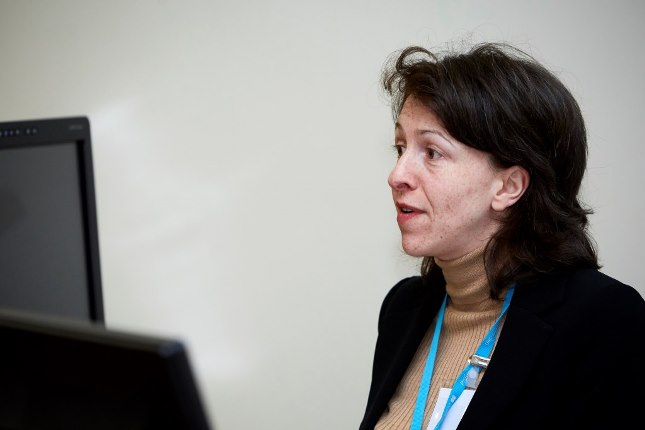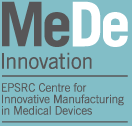Looking forward: Dr Maria Katsikogianni

February 2, 2017
Our ‘Looking forward’ series gives an insight into the developing careers of MeDe Innovation community alumni, and how the programme has helped them to achieve their goals.
The second blog in the series is from Dr Maria Katsikogianni, a Lecturer of Biomaterials Chemistry at the University of Bradford. Maria recently won the MeDe Innovation ‘Dragons Den’ award for a project in collaboration with the University of Sheffield.
Currently, we are living in an ageing society and associated with this is an increased demand for prosthetic joint replacements. Indeed it has been estimated that by 2030 there will be over 3.8 million people who will have received arthroplasties (Age UK). In parallel, epidemiological studies of fracture incidence in England document that more than 2 million people/year suffer bone fractures that are managed using a range of medical devices. At present, the most serious complication that is associated with the use of medical devices is infection. Medical device associated infections are extremely difficult to treat as they invariably involve microbial biofilms on the surface of the implant, that are resistant to many currently available antibiotics, and therefore represent an extensive and growing financial and healthcare burden.
The increasing resistance of bacteria to antibiotics has stimulated interest in employing strategies for the preparation of biomaterials that resist bacterial adhesion or have bactericidal properties.
My main area of research is this of engineering and testing the efficacy of antimicrobial materials to prevent bone infections. My research is therefore driven by an immense clinical need. I started being active in this area since my PhD, by examining the mechanisms of bacterial adhesion to biomaterials and how materials chemistry and in vivo mimicking flow conditions affect bacterial adhesion and bacterial gene expression. This research led to a number of publications and book chapters and myself to my next step which was a postdoctoral position at University College Dublin that was about the design and testing of antimicrobial food packaging using natural antimicrobials. The success of this research led to a patent application and an evaluation license agreement with a food processing company to enhance the food packaging shelf life.
At the University of Leeds I had the opportunity to continue my research activities in the area of antimicrobial implants, using fluorapatite for dental applications. An iMBE travel funding award allowed me to undertake a 2 week Secondment at Professor Hancock’s labs, at the University of British Columbia, to explore the potential of Host Defence Peptides against antibiotic resistant bacteria. In order to further enhance my awareness of the translation process I completed a Postgraduate Certificate in Professional Innovation Management from the University of Leeds Business School.
At the University of Bradford, MeDe Innovation gave me the opportunity to pursue research in the area of medical devices associated infections, through a MeDe Innovation Fresh Ideas Fund for “The manufacture of medical device surfaces that are resistant to microbial colonisation” and though the ‘Dragons Den’ award for the project: “Innovative manufacturing of composite materials with enhanced osteogenic and antibacterial properties”.
Teamwork
I very much enjoy good collaborations and cross-disciplinary projects, as I strongly believe that medical device development can be nothing else than the result of teamwork. Understanding and combating medical device associated infections is a highly complex and cross-disciplinary challenge requiring collaborations between material scientists, chemists, engineers, (micro)biologists, clinicians and industrial partners, amongst others. Sometimes it can be quite difficult to find a common language to communicate with all the various disciplines, however MeDe Innovation is a great platform for the initiation of these discussions and collaborations, for early career researchers too. The MeDe Innovation Fresh Ideas Fund gave me the opportunity to collaborate with Prof David Williams at Cardiff University and the ‘Dragons Den’ award enables the collaboration with Dr Santocildes Romero and Mr Paterson at the University of Sheffield. I am also in the Management committee of the COST EU Action TD1305 “Improved Protection of Medical Devices Against Infection (IPROMEDAI)”, under which I lead the orthopaedic focus group, towards antimicrobial/non-fouling testing standardisation. In January 2016 I organised the first focus group meeting, in parallel to the MeDe Annual Conference, and this was a great opportunity for discussions about the clinical reality and the various constraints.
Teaching
Apart from research, I very much enjoy teaching. I started teaching last year and I supervise final year project and master students, while I run tutorials. Enhancing students understanding and employability is extremely rewarding. Last year my final year project student won the IMeChE Best Final Year Project Award and secured a fully funded PhD position. This made me feel I had managed to transfer some of my expertise to the next cohort of students and from being in a position of always receiving to actually start providing mentoring. During this process I feel I gained as much as I gave, if not more.
Applying for Funding
I will not shy away from mentioning that applying for funding is a challenging process and does not always go to plan. There have been times that my applications to funding bodies and positions have been beaten by others, highlighting how competitive and small my field of science can be at a global level. Reflecting upon my experience, I find that I should had started with smaller grant applications and progressively raise the game, but it is never too late. The MeDe Innovation ‘Dragons Den’ sandpit event, that was organised by Early Career Researchers, is an excellent example; after a two-day workshop during which Dr Rachel Woolley, Dr Jo Dixon-Hardy, Dr Emma Sinfield, Dr Graeme Howling and Dr Fiona Kingscott took us step by step through an RCUK application process, pitching and winning the ‘Dragons Den’ award was really rewarding. Along with the MeDe Innovation Fresh Ideas Fund, these two successful bids have not only significantly boosted my confidence but have given me also the chance to gain experience, further build my track record, collect preliminary data, establish collaborations and be ready for the next steps.
My key messages are:
- We need to accept that academia is a very competitive world. If you are really passionate about what you do, ready to get involved and collaborate, you always find a way to deal with that and to increase your chances of success.
- Grow a third, fourth or fifth skin; failure is part of the game and after a while it could be seen as practice for success, if feedback is taken into account.
- “We make a living by what we get, we make a life by what we give.” Winston Churchill. I find this quote to really represent the nature of medical device development.
